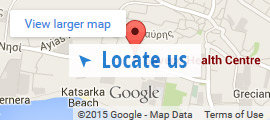
Gastroenteritis (Stomach flu)

CAUSES OF VIRAL GASTROENTERITIS
Gastroenteritis is inflammation of the gastrointestinal tract, involving both the stomach and the small intestine. Viral gastroenteritis is an infection caused by a variety of viruses which can result in vomiting or diarrhoea; some people can experience both symptoms. Viral gastroenteritis is often called the ''stomach flu'', although it is unrelated to influenza.
Many different viruses can cause viral gastroenteritis these include rotaviruses, noroviruses, adenoviruses, type 40 or 41, sapoviruses and astroviruses. Viral gastroenteritis is not caused by bacteria which include salmonella, shigella, staphylococcus, campylobacter jejuni, Escherichia coli, Yersinia, and others.
Bacterial gastroenteritis is rarer than viral gastroenteritis, and risk factors include poor sanitation, improperly prepared food or contaminated water, the symptoms of both bacterial and viral gastroenteritis may be similar and should be assessed by a doctor who can determine if the diarrhoea is caused by a virus or something else.
SYMPTOMS
Gastroenteritis often involves stomach pain or spasms, diarrhoea or vomiting and in some cases both can be present. Diarrhoea is one of the most common reasons patients seek medical help. The affected person may also have headache and fever. The severity of illness may vary from mild and inconvenient to severe and life threatening. Appropriate management of symptoms is important and should require extensive history and assessment. Diarrhoea associated with nausea and vomiting is referred to as gastroenteritis. In general symptoms begin 1 to 2 days following infection with a virus that causes gastroenteritis and may last 1 to 10 days, depending on which virus causes the illness.
DIAGNOSIS
Diagnosis of viral gastroenteritis should be made by a doctor. Your doctor will take a detailed assessment of your symptoms as well as carrying out a physical examination. Rotavirus infection can be diagnosed by sending a stool sample to the laboratory for testing.
MANAGEMENT
The objective of treatment is to replace fluids and electrolytes, depending on the degree of dehydration; this can be done by oral rehydration or through intravenous delivery. Your doctor will give you specific instructions about what kinds of fluids to take. Depending on the severity of symptoms you may be given treatment for vomiting, nausea and diarrhoea. If bacterial gastroenteritis is suspected or identified then antibiotics may be used.
COMPLICATIONS
The most serious complication is dehydration, usually due to severe diarrhoea; this can sometimes be made worse due to improper treatment such as withholding fluids until the diarrhoea stops. Severe dehydration is very dangerous and requires prompt medical care.
GASTROENTERITIS IS HIGHLY INFECTIOUS
It is essential to practice good hygiene, such as washing your hands after going to the toilet and before preparing food. If you or your child has gastroenteritis, do not return to work, or let your children go to school or nursery, until 48 hours has passed since the last episode of diarrhoea or vomiting.
For advice during your holiday in Ayia Napa Cyprus contact medical services Ayia Napa - Protaras. Dr Savvas Economides M.D
in Agia Napa?
Giourin Gkagkarin 29,
5330 Ayia Napa
P.O. Box 30868,
5346 Ayia Napa,
Cyprus
in Larnaca?
Evagora Pieridi 11,
Larnaca





